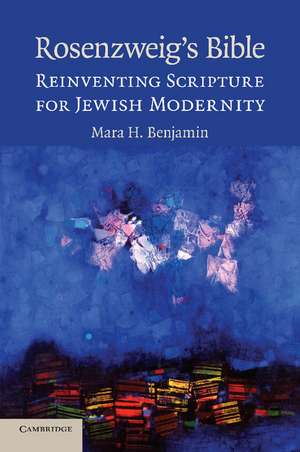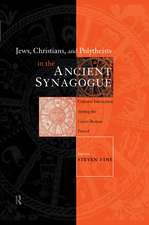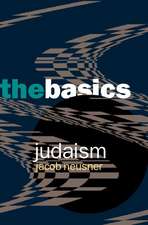Rosenzweig's Bible: Reinventing Scripture for Jewish Modernity
Autor Mara H. Benjamin PhDen Limba Engleză Paperback – 18 dec 2013
| Toate formatele și edițiile | Preț | Express |
|---|---|---|
| Paperback (1) | 314.01 lei 6-8 săpt. | |
| Cambridge University Press – 18 dec 2013 | 314.01 lei 6-8 săpt. | |
| Hardback (1) | 418.08 lei 6-8 săpt. | |
| Cambridge University Press – mar 2009 | 418.08 lei 6-8 săpt. |
Preț: 314.01 lei
Nou
Puncte Express: 471
Preț estimativ în valută:
60.09€ • 65.25$ • 50.48£
60.09€ • 65.25$ • 50.48£
Carte tipărită la comandă
Livrare economică 23 aprilie-07 mai
Preluare comenzi: 021 569.72.76
Specificații
ISBN-13: 9781107663251
ISBN-10: 1107663253
Pagini: 222
Ilustrații: 2 tables
Dimensiuni: 152 x 229 x 13 mm
Greutate: 0.33 kg
Editura: Cambridge University Press
Colecția Cambridge University Press
Locul publicării:New York, United States
ISBN-10: 1107663253
Pagini: 222
Ilustrații: 2 tables
Dimensiuni: 152 x 229 x 13 mm
Greutate: 0.33 kg
Editura: Cambridge University Press
Colecția Cambridge University Press
Locul publicării:New York, United States
Cuprins
Introduction: the decline and renewal of scripture; 1. Scripture in the star of redemption; 2. Yehudah Halevi: the creation of a scriptural world; 3. Bible translation and the shaping of German identity; 4. Toward a new encounter with the Bible; Conclusion: scripture today: some considerations.
Recenzii
'The standard reading of Franz Rosenzweig's life and thought is that the thought culminated with the publication of his magnum opus the Star of Redemption in 1921 and that his life as a Jewish educator in Frankfurt was a realization of the mandate of that great work. But this reading suggests that Rosenzweig's remaining thinking and writing are ancillary to the system of the Star. Benjamin's provocative proposal, which she develops with clarity and intelligence, is that the Star is not the end but rather the beginning of Rosenzweig's life-long project. His entire professional career can be viewed as an effort to read and understand the biblical text. Benjamin's readings of the Bible in the Star, in Rosenzweig's translations and commentary of the poems of Yehuda Halevi, and in the Biblical translation project with Martin Buber map three stages on a journey that lasted until his death in 1929. The book gives us a novel and fascinating picture of this important Weimar Jewish intellectual.' Michael Morgan, Indiana University
'In this nuanced and noteworthy book, Mara Benjamin shows how the great German-Jewish philosopher Franz Rosenzweig struggled to define what the ancient Hebrew liturgy could mean to Jewish existence under the radically altered conditions of late modernity. Textually precise without ever losing sight of the broader context of Weimar-era theology, Rosenzweig's Bible makes a lasting and significant contribution to the current debate concerning Rosenzweig and the modernist reinvention of Jewish tradition.' Peter E. Gordon, Harvard University
'This work should certainly be read by anyone who is interested in the central role that all things biblical have played in modern theological discussions, and Jewish theology in particular.' AJS Review
'In this nuanced and noteworthy book, Mara Benjamin shows how the great German-Jewish philosopher Franz Rosenzweig struggled to define what the ancient Hebrew liturgy could mean to Jewish existence under the radically altered conditions of late modernity. Textually precise without ever losing sight of the broader context of Weimar-era theology, Rosenzweig's Bible makes a lasting and significant contribution to the current debate concerning Rosenzweig and the modernist reinvention of Jewish tradition.' Peter E. Gordon, Harvard University
'This work should certainly be read by anyone who is interested in the central role that all things biblical have played in modern theological discussions, and Jewish theology in particular.' AJS Review
Notă biografică
Descriere
Mara Benjamin argues that Rosenzweig's reinvention of scripture illuminates the complex interactions between modern readers and ancient sacred texts.














